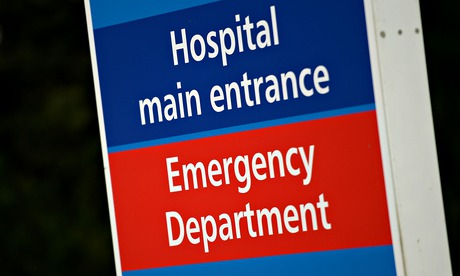
The NHS wants your feedback. I know this because they ask for it. On a cold evening in October last year, my wife Jane and I had to make a sudden, desperately unwanted trip to our nearest A&E department. Jane was 12 weeks’ pregnant, and we were concerned she might be having a miscarriage.
The waiting room wasn’t as crowded as we had feared it would be, though it certainly contained a few scattered casualties of nights out gone wrong. Within half an hour we were taken to what looked like a storage room, where we were attended by a gynaecologist who performed an ultrasound scan on Jane. She was calm, compassionate and clear, and I could see that she desperately wanted to find what was no longer there; but the awful truth dawned on all three of us long before she gave in to it. Eventually the doctor put down the scanner and paused briefly. Then came the euphemistic diagnosis: “I’m afraid this pregnancy has not progressed in the way that we would have hoped.”
Jane was given some strong painkillers and plastic sheeting to take home, and warned to expect a long night, as our longed-for son or daughter would break down and emerge, unrecognisably, in stages. I thanked the doctor for her sensitivity and care, put my arm around Jane, and we left. As it happened, our unfortunate baby didn’t emerge as had been described. Jane felt something give way as we walked through the car park. She lay on the back seat, and I came face to face with a tiny human being who wasn’t strong enough to make it. It was quick, brutal and utterly devastating. We drove home and started the slow process of coming to terms with our loss. The grief was volcanic. Jane woke in the middle of the night howling “I want my baby back”, having dreamed of a happier ending and, emerging from sleep, been forced to confront the nightmare of reality once again.
The next day Jane received an automated text message. It read: “We would like you to think about your recent experience in the A&E department. How likely are you to recommend our A&E department to your friends and family if they needed similar care or treatment? Please reply 1 for extremely likely, 2 for likely, 3 for neither likely nor unlikely, 4 for unlikely, 5 for extremely unlikely, or 6 for don’t know. Please reply today, texts are free of charge. Your feedback is anonymous and important to us and helps us to improve our service.”
Two days later, while staying with my parents, we attended the Royal Surrey hospital for a follow-up scan to make sure everything was OK. Once again Jane received an almost-identical text message the following day, a system being used across different NHS authorities called “the friends and family test”. It’s difficult to describe how crass and inappropriate those messages were. What are they for? I can imagine a faceless man in a suit pointing to a pie chart at a meeting of senior managers and telling his colleagues that customer satisfaction is at a record high. He’ll probably get a pay rise for improving results. But here’s the thing: Jane and I had already given our feedback. We had thanked the excellent doctor who witnessed our anguished hope, who entered into that space with us at the start of a long night in A&E and held our hands when our nightmare became reality. I can’t speak highly enough of her, and I say that knowing full well that we probably weren’t the last people whose lives she saw being shattered that night. That’s the place for feedback: face to face, sincere thoughts and feelings expressed from one human to another.
To the faceless bureaucrat who thought those text messages were a good idea, I would make the following plea: we come to you in the darkest moments of our lives. You see us through them, whatever the outcome, and then you move on to the next patient. You do this because that’s what the NHS is for, and it’s a beautiful institution. In the vast majority of cases we go to the nearest and most convenient hospital, which renders utterly redundant the notion of “recommending” your facility as if it were a restaurant or a B&B. Please, get rid of the gimmicks – the faux-concerned and impersonal feedback loop and the specious “choice” paradigm designed to soften us up for privatisation – and listen to your frontline staff. They know what’s really going on, and they’re the remarkable people who really care enough to face broken humans every single day.

